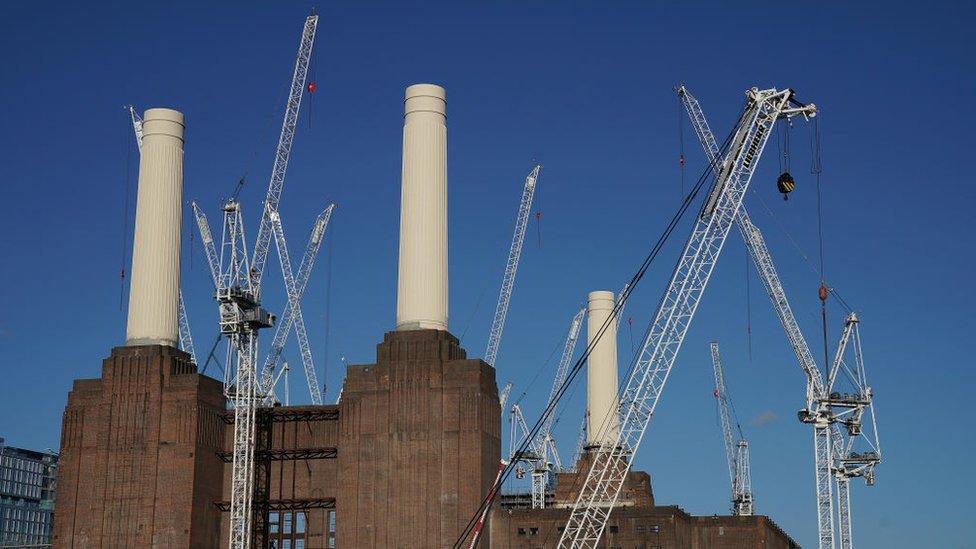Ambulances not cavalry: the Carillion response
- Published
- comments

Carillion is the UK's second largest construction firm and employs 43,000 people globally
Since the liquidation of Carillion on Monday we have seen a taskforce assembled, some out-sourced services rapidly insourced, and a clutch of banks offering rescue funds for damaged firms.
But make no mistake these are not cavalry, these are ambulances.
The full scale of this corporate car crash has emerged over the week and it is much worse than at first thought.
The banks who finally pulled the plug are owed £1.3bn and the pension fund deficit is between £800-900m. Given that there was only £29m left in the bank at the point of liquidation, the tens of thousands of businesses owed money by Carillion will be lucky if they get more than zero of that money back.
Profound effects
Lloyds, RBS and HSBC have announced emergency funds for the businesses affected totalling £225m but these funds are NOT a kitty to compensate short-changed suppliers.
They are funds set aside to offer payment holidays on debts owed and waivers on overdraft fees that would usually be charged.
The hole blown in supplier finances will not shrink as a result.

Carillion worked on the Battersea Power Station revamp
The knock-on effects will be profound. Even companies not directly exposed to Carillion will be exposed to companies that were exposed to Carillion.
The flurry of activity from the government after the death of Carillion is in stark contrast to the lack of engagement in the period after it was clear it was mortally wounded.
Carillion board members tell me that no senior minister met the company in the months after the massive profit warning of July 2017 - a state of affairs one described as thinking "very odd".
In the end, as we know, the banks refused to extend any more credit without government support and I'm told by one of the lending bank's chief executive that its decision to refuse support did not even make it to his desk.
Given the highly political nature of this bust that is either surprising or indicates just how clear-cut the situation facing the company was.
I'm also told that bailed out RBS was the keenest to tighten the noose round the company's neck.
Hold nose
A last minute plea for short term funding of £150m from the government to give it breathing space to restructure was refused. Some have argued that it would have been cheaper for the government to hold its nose, abandon the principle of not using public money to prop a private company, and hand the money over.
Sources at industry competitors tell me they will want up to 20% more than Carillion was being paid to take over manifestly under-priced contracts.
If that is even close to correct, the failure of Carillion will end up costing the government and the taxpayer many hundreds of millions of pounds.
Failure
In the government's defence, it is doubtful that a £150m last-minute bung would have made any difference to the final outcome - such was the graveness of this ever-optimistic company's condition.
This was first and foremost a private company failure exposing greedy and incompetent management.
How else to describe an ever-increasing dividend policy for a company with serious cash flow problems and a rising pension deficit?
How else to describe the attempts of management to make it harder to claw back bonuses in the event of the company going bust?
It is also a failure of the capital markets. Institutional shareholders exert enormous pressure on companies to keep those dividends coming - sometimes in the face of rising a pension deficit and cash flow problems.
A self-defeating imperative in this case. By the end, they were all long gone.
The only people left holding the shares were index funds - who are forced to hold shares in all listed companies - and a few retail investors who hoped this was the mother of all bargain-basement opportunities.
'Recession mindset'
The other reason for Carillion's failure can be found ten years ago. The contracts that turned sour were priced up in the immediate aftermath of the financial crisis. One industry insider said the biggest of the bad apples - the £750m Aberdeen by-pass - was bid for and awarded "with a recession mindset" - namely, keep the work coming, the workers working and the supply chains intact at all costs.
Carillion's management aggravated the situation with piling on too much debt, chasing new business at "suicide" prices to make up for cash shortfalls but there are echoes of the financial crisis still reverberating round the construction industry.
The construction industry is pretty resilient. Workers at a Carillion site I visited on Wednesday were angry they couldn't get on site to get their tools and move on to another job. A government official pointed out its not unusual for a contractor to go bust on a Friday and turn up at the same job on Monday in a van with a different name on the side.
This is on an entirely different scale.

More from Simon Jack

- Published15 January 2018

- Published12 January 2018